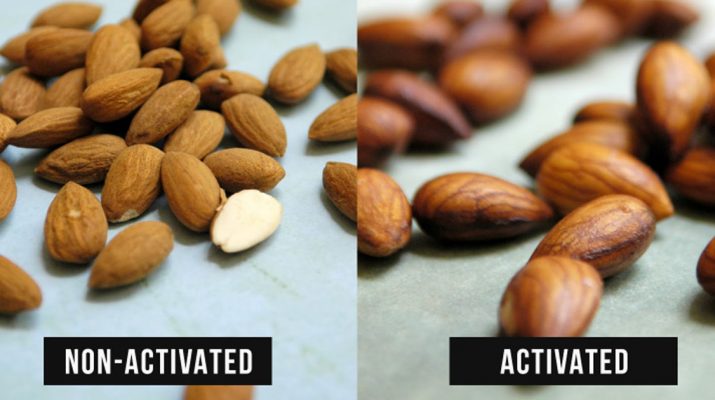Nuts and seeds are full of nutrients, healthy fats, and fiber, and if they aren’t already a part of your diet, you should definitely consider adding them in. They make for easy, delicious, and satisfying snacks, and can add a huge punch of essential nutrients to otherwise lacking meals and smoothies.
Get The Most Out Of Your Nuts
If you are eating roasted nuts I urge you to consider switching to raw, dried nuts. Unfortunately, during the roasting process, the natural oils in the nuts often become rancid and this can lead to various health concerns. Many companies use cheap oils to roast their nuts as well. To preserve the integrity of your nuts without sacrificing that delicious roasted flavor, you should buy them raw and roast them yourself, making sure to eat them as soon as possible (but waiting for them to cool down before doing so!)
Why Should Nuts & Seeds Be Activated?
To take full advantage of everything nuts have to offer, you must first soak them for several hours or overnight in a process known as activation.
Nuts and seeds contain something called Phytic Acid – the storage form of phorphorous in plants. It binds to minerals like iron, zinc, magnesium, calcium, and manganese in the digestive tract, rendering them unavailable to us. If we consume too many phytic acid containing foods on a regular basis, we run the risk of developing mineral deficiencies and potentially osteoporosis. If you eat a few nuts here and there this likely won’t affect you, but if you’re someone who eats handfuls a day, then you should consider activating your nuts.
Some animals have phytase in their bodies, the enzyme which breaks up phytic acid, but unfortunately we humans do not. Fortunately, we do have tools available to us to recreate this enzyme so that we can effectively obtain all the nutrients and minerals these nuts and seeds have to offer. Soaking, sprouting, and/or fermenting our nuts and seeds helps neutralize phytic acid.
Nuts And Seeds Also Contain Enzyme Inhibitors
Enzyme inhibitors occur naturally, preventing nuts and seeds from sprouting prematurely. In the wild, nuts and seeds can lay dormant for a long time while waiting for ideal germination conditions — warmth and moisture. The inhibitors clog up and essentially deactivate the active site of an enzyme, which is why unsprouted nuts can be difficult to digest.
Soaking and activating nuts and seeds diminishes the phytic acid and essentially switches off their enzyme inhibitors, making the enzymes available to us. Soaking dried nuts tells the nut that it is time to germinate so it can switch off these elements and begin the sprouting process.
How To Activate Your Nuts
If you eat a lot of nuts you can save time by activating your nuts and seeds in large batches, though you can of course do this daily if you prefer.
- Pour 2 Cups of your favorite nuts or seeds into a large bowl (except for hemp and chia seeds, which are fine on their own).
- Cover your nuts with filtered water and 2 teaspoons of sea salt. Make sure they are completely submerged with about 2 inches of water on the top.
- Most nuts and seeds should be soaked between 7-12 hours, with the exceptions of cashews, which take between 3 and 5 (any longer and they get slimy), and almonds, which can take 12-14.
- After soaking, strain off excess water and rinse.
- If you have a dehydrator place nuts on dehydrator racks, if not you can use cookie sheets in an oven and slowly dry the nuts at 150 degrees F or 65 degrees C. The drying time will vary between nuts.
- When they are completely dried out, store nuts and seeds in an airtight container in the fridge. Unless you plan on eating them that day, make sure they are completely dry, otherwise they will quickly spoil.

